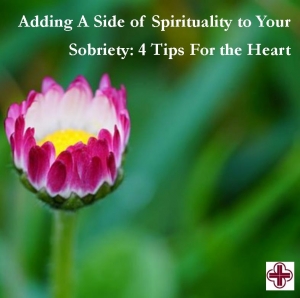To begin, I congratulate and thank you for taking an interest in this subject matter. Sobriety and spirituality are two complicated topics on their own, let alone used in the same sentence. Any addiction, be it shopping, cutting, food, sex, drugs or alcohol is likely one of the hardest ties to cut for the human. People who enter into recovery deserve the most heartfelt admiration. Giving up an addiction does not always “make sense” to the user given that this relationship can run deep for so many many reasons.
Then there is this word spirituality. Researchers have been documenting the benefits of spiritual practices in recovery since the early 1900s. However, Native Americans have incorporated spiritualty into recovery since the late 18th century. It is no secret that folks who venture into their own personal spirituality have the best rates of long-term abstinence. I have been treating addicts for 15 years in the field of mental health and I have to admit, there is something amazing that happens to a person if they invite spirituality into their being. These folks posses some kind of beautiful and peaceful hold inside themselves that the hardships of death, HIV, financial loss, and abandonment just does not seem to crack. It’s like these people have an internal superpower that frankly is mystifying to witness. In actuality, recovering folks would benefit from starting with a side of spirituality in recovery; and over time building up to a whole plate.
I know that this spirituality stuff is complicated. To start, it is not something that you either have or you don’t. We all are lead by organizing principles that are either life giving or depleting. Then there are growing numbers of people that are starting to acknowledge that we are spiritual beings having a human experience on this challenging Earth plane.
Addictions by their very nature, block out spiritual parts of ourselves that create a barrier to perspective, self-compassion, connectedness to others, and meaning to our lives. Further, the sense that we are being seen and held by something more powerful than ourselves is typically fragile, if not severed. Shame and guilt can do a number with or without conscious awareness. For many clients that I see, spiritual deadness is a highly unacknowledged piece and even more so to those folks who never had a foundation of spirituality and/or religion. Traumatic childhoods often cause people to feel eternally deserted or betrayed. And for the record, one does not have to be religious to be spiritual. Spirituality involves one’s own personal beliefs about their connections and relationship to something bigger. This can certainly involve solely a decree of certain moral and ethical standards that feel right in the gut.
I get that the spiritual path is not let’s say “Woot woot exciting” when first contemplating what one’s healthiest relationship with an addictive pattern might be. Often it can be placed on the back burner. Matters that need to be addressed right away like upset loved ones, health, legal issues and money take up a lot of emotional energy. I often compassionately think about my clients who do have a place of worship might be sarcastically thinking, “Oh yes, Dr. Wagner I want to run to Church and sit there and think that God is looking at me and thinking…Oh great, there is one of my favorite children who spends more time with Jack Daniels than his own son Jack……..Ah, no thanks.” In light of the difficulties, I have some suggestions to get you started.
- Start with baby-steps. Think about what inspires you, such as helping others, starting a creative project, reading 5 minutes a day of spiritual material, or taking a walk in nature. The longer that I am in the field the more that I can appreciate how slow and steady wins the race. It also makes taking the next right step seamless. Things at some point, likely when you are not even looking, will pick up speed. Many people feel that a deep spiritual grounding takes place after sobriety has been established for a while. Small comfortable gestures are a safe way to lay the foundation for a future awakening.
- Connect with something to ground you. No one succeeds in a vacuum. This may be a person or group, a poem, a 12 step-meeting, an on-line chat room, or even something as simple as placing a spiritual item on your night stand – It can even be a picture of your kids. Inspiration from another person who has taken a healing journey can motivate you to think creatively about what you need. Take a walk around a bookstore and see what strikes you. There are also really great YouTube videos regarding all aspects of recovery. They can really hit the spot for those days that getting out of the bed seems like too much effort. I am a fan of the 12-step programs such as Alcoholics Anonymous (AA) and Narcotics Anonymous (NA); its free and practically available 24/7. Can’t beat that. The program states that anything can be your higher power, such as group members and a sponsor. The point is that you can draw strength and wisdom outside of yourself. All these people who have figured out how to maintain sobriety, just might know something that would be of great use to you. They are also the coolest, down to earth and witty people around. Moreover, they get it. Meetings are a place to feel normal. The unconditional positive regard that these circles offer is spiritual and love is where the healing lies. There certainly are alternatives to AA/NA. To find some just google “local alternatives to AA.” Strong relationships are key to well-being; humans are wired to exist in secure communities. Isolation leads to mind-body-spiritual decay. Finding a therapist who specializes in addictions would also be a great start. They will often have additional certifications in addictions treatment in addition to their graduate degree in psychotherapy.
- Take care of your body. Yeah, I know food, caffeine and nicotine can often be so soothing early in the game. Be careful to not switch to a new drug of choice. Addictions prevent us from connecting to our spiritual core and taking care of our physical container helps bring in a healthy flow. For many, the path of least resistance is to add in healthy activities and slowly let go of bad habits. The body is often looking for the dopamine that a drug of choice provided. It takes training for someone to actually prefer deep breathing, a walk and asking for help. Meditation is another great way to help a short emotional fuse get longer. I would recommend YouTube guided meditations for early recovery stress reduction or you can look for specific topics such as anxiety, enhancing well-being or sleep. Self-soothing often can be best achieved though a combination of first finding something outside of yourself, such as talking to someone and/or doing something physical and then grounding yourself through supportive self-talk. These habits require much practice in order to become a neurological reflex. You do have to train your brain. So, make your practices fun and rewarding.
- Establishing mind-body-spiritual healing requires a whole lot of self-love and patience with the process. People with addictions often have the deepest wounds and excel at self-deprecation. Shockingly so (at least it was counter-intuitive to me) people who have medical detox vs. toughing it out at home have lower relapse rates. Suffering of any kind prolongs problems. Staying in the present and not expecting life to do a 180 in 6-10 months is the best present you can gift yourself. There is nothing more spiritual than treating yourself with beautiful grace and encouragement, just as you would with a friend or child.
Spirituality nudges us to reach for those higher realms that get us out of our egos. Often the addict is caught inside the flip side of positive spirituality and is trapped in anger, a false sense of control, entitlement, and reams of fear. Carl Jung MD, a psychiatrist who played a role in the early development of psychotherapy, as well as being credited for planting the seeds for the development of AA, made an interesting connection between recovery and spirituality. He indicated problems in life cannot be fixed, yet they can be released though transcendent spiritual growth. May the above suggestions provide you with guidance, hope and inspiration to plate-up.
Dr. Dana Wagner is a Licensed Clinical Psychologist with a Doctorate in Clinical Psychology from the Illinois School of Professional Psycholog as well as a certified alcohol and other drug counselor. She has worked in a variety of settings including: an employee assistance center, a college counseling center, the Cook County Jail, and residential and outpatient substance abuse programs. Dr. Wagner enjoys working with adults and adolescents experiencing a wide array of psychological issues. Her areas of interest include working with individuals struggling with anxiety/panic attacks, work-related stress, substance abuse/addictions, childhood trauma, trichotillomania, depression, adolescent issues, emotional eating, relationship issues and spiritual concerns/mystical experiences/near death experiences. Dr. Wagner can be reached at 630-357-2456, extension 34 or at dwagner@samaritancenter.org.
Samaritan Interfaith inspires hope, facilitates change and creates lasting impact on individuals, families and faith-based organizations. We offer Spirit led, compassionate care through counseling, education and consulting.



Comments are closed.